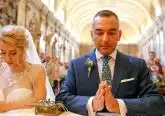Catholic teens in US mirror their peers on religious trends
by Matt Hadro
Washington D.C., Sep 11, 2020 / 12:00 pm MT (CNA).- Catholic teenagers mirror American teenagers overall on many religious trends, a report by the Pew Research Center says.
A Pew report published Sept. 10 examined the religious identities and beliefs and American teenagers and their parents. “U.S. Teens Take After Their Parents Religiously, Attend Services Together and Enjoy Family Rituals,” Pew reported, but added that the teens usually do so “at parents’ behest” and many of them privately hold different beliefs.
The statistics show that Catholic teenagers are more likely to mirror teenagers overall in their religious beliefs than are Evangelical Christian teenagers.
Of teenagers ages 13-17 in the U.S., 24% say that religion is “very” important to them, and 36% say that it is “somewhat” important in their lives. Among Catholic teenagers, they are only slightly more likely (27%) say that religion is “very” important to them.
Substantially more Catholic teenagers (46%) say religion is “somewhat” important, than do their peers (36%). While 18% of teenagers overall say religion is “not at all” important to them, only 4% of Catholic teens answered this way.
And Catholics are only slightly more likely than their teenage counterparts overall to believe in God “with absolute certainty” (45% to 40%), and attend religious services weekly (40% to 34%). Only four-in-ten (41%) of Catholic teenagers say it is necessary to believe in God to be moral, and 31% say that only one religion is true.
Meanwhile, Evangelical Christian teens are far more likely than Catholic teens to believe in God with certainty (71% to 45%), attend religious services weekly (64% to 40%), pray daily (51% to 27%) and say only one religion is true (66% to 31%).
Catholic teenagers also mirror teenagers overall in other trends, such as 54% of Catholics feeling a deep sense of spiritual peace and well-being compared to 50% of teens overall, and 50% of Catholic teens thinking about the meaning and purpose of life, compared to 46% of teens overall.
The Pew survey also confirms a growing trend of “nones,” or teenagers and young adults who are religiously-unaffiliated. One-third (32%) of teenagers surveyed are “nones,” with 6% identifying as atheist, 4% as agnostic, and 23% as “nothing in particular.”
The U.S. bishops’ evangelization committee chair, Auxiliary Bishop Robert Barron of Los Angeles, has discussed this trend of young Catholics leaving the faith and becoming religiously-unaffiliated.
In a presentation to the bishops at their 2019 fall meeting, Barron noted that many young people do not respond well to the Church’s teachings, especially on sex. However, they do manifest a strong sense of “social justice,” he said, and the Church should “propagate” its social teachings. He also emphasized that the Church should present the beauty in its liturgies, and “stop dumbing down the faith.”
And although teenagers might attend religious services at a similar rate as their parents, they differ from their parents on their religious views.
According to the Pew report, teenagers of parents who are Evangelical Christians, Catholics, or Unaffiliated, are likely to identify as the same. However, children of parents who are part of Mainline Protestant denominations are much less likely to identify as such; they are twice as likely (24%) to be religiously-unaffiliated than are their Evangelical counterparts (12%).
Of the teenage children of Catholic parents, 81% of them identify as Catholic but 15% are religiously-unaffiliated.
Teens are nearly half as likely as their religious parents to say that religion is very important in their lives, with 43% of parents answering that way to only 24% of teens. Of parents who said religion is “very important” in their life, only 45% of their teens answered the same, and 41% of the teens said religion was “somewhat important” to them
However, in households where parents say religion is not important to them, their teenagers are far more likely to hold the same religious priorities. Among parents who said religion was “not too important” or “not at all important” to them, 82% of their teenage children answered the same.
Religious parents are also more likely to desire that their child have a particular accomplishment, such as going to college or being financially successful, than being raised in the same religion, Pew reported.
Religiously-affiliated parents “are more likely to place high importance on their teen being hardworking, independent or helpful to others than they are to say it is very important that their teen is raised in their religion,” the report said.
And among Christian parents, Catholic parents were more likely than their Protestant peers to say it is “very important” that their teen goes to college (83% to 66%) and is financially successful (75% to 67%).
Meanwhile, only 62% of Christian parents answered that it is very important that their teen be obedient, and only 51% of Catholic parents said it is very important to raise their child in their religion, compared to 58% of Protestant parents overall.
As far as the religious education of teenagers, Catholic teens are about as likely as Christian teens overall to have been in a religious education program (72% of Catholics to 74% of Christians). However, 43% of these Catholics said they attend rarely or do not go any more. Meanwhile, 49% of Catholic teenagers answered that they have been part of a youth group.
Older teens are “somewhat less likely” to say they attend religious services regularly, Pew reported.
Political affiliation of households also stands out with respect to religious practice.
“Teens whose parents identify with or lean toward the Republican Party seem to be more religiously engaged by some measures than those whose parent is a Democrat or Democratic-leaner,” Pew reported.













